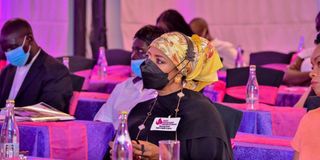Tergat: Ban GBV offenders in sports for life

Sports Cabinet Secretary Amina Mohamed follows proceedings at the Agnes Tirop gender-based violence conference at Diani Reef Hotel in Kwale County on January 18, 2022.
What you need to know:
- The committee chaired by legendary athlete Catherine Ndereba did the audit and officially handed over a report of the findings to the CS on Monday.
- “This report will not gather dust; we will get down to work immediately and implement it. This is a journey; we have to start somewhere. Our athletes make Kenya proud when they excel at major championships, therefore, we must ensure that they feel safe,” the minister said.
Perpetrators of gender-based violence in sports should be banned for life, National Olympic Committee of Kenya (NOC-K) President Paul Tergat said Tuesday.
“They need to be blacklisted and should never hold office or represent the country in any competition. The abusers are known; we need to name and shame these people; we don’t want to see them in sports. It should not be business as usual,” he said.
In an interview with Nation Sport on the sidelines of the Agnes Tirop Conference that is being held at Diani Reef Hotel in Kwale County, Tergat said that enough is enough and something must be done urgently.
The gender-based violence conference, the first of its kind in Kenya, was named in honour of star athlete Agnes Tirop who was found murdered in her home in Iten, Elgeyo Marakwet County on October 13 last year. Her estranged lover, Ibrahim Rotich, denied murder charges in court and is in police custody.
Tergat said a strong message needs to be sent to individuals who think that they can destroy athletes’ lives and get away with it.
“The conference will not achieve its intended purpose if deterrent measures to curb gender-based violence are not enforced. Young people cannot continue facing such cruelty,” he said.
Sports Cabinet Secretary Amina Mohamed had in July last year appointed a Ministerial Committee on Gender Welfare and Equity in Sports following a directive by President Uhuru Kenyatta to conduct an audit and examine challenges facing women in sports.
The committee chaired by legendary athlete Catherine Ndereba did the audit and officially handed over a report of the findings to the CS on Monday.
“This report will not gather dust; we will get down to work immediately and implement it. This is a journey; we have to start somewhere. Our athletes make Kenya proud when they excel at major championships, therefore, we must ensure that they feel safe,” the minister said.
For his part, NOC-K Secretary Francis Mutuku said that the organisation is making deliberate efforts to ensure equity in sports.
“The number of women athletes who competed at the 2008 Beijing Olympic Games was 18, at the 2012 London Olympic Games there were 20, during the 2016 Rio Olympic Games we had 42 and at the 2020 Tokyo Olympic Games, the number shot to 48. Three out of the four members of the technical support team in Tokyo were women,” he said.
Mutuku said that going forward, federations must have a 60/40 ratio of representation in their men’s and women’s teams.
He said that NOC-K has written to federations preparing for the Commonwealth Games to ensure that they adhere to the rules. The Commonwealth Games will be held on July 28-August 8 in Birmingham, United Kingdom.
During the question and answer session, concern was raised by some officials representing federations that there is skewed coverage of sporting activities in favour of men.
The federations were told to have a robust communication team, have physical offices and send information articulately and on time because of stiff competition for limited space and tight deadlines.
Participants also complained that men’s teams get more funding than women even when they performed better.





